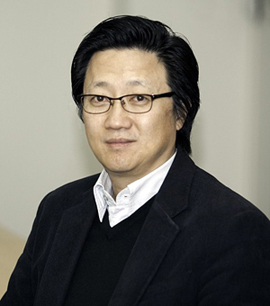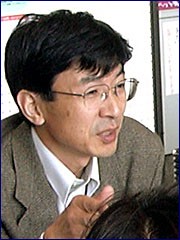 |
 |
| ICIS 2010 Keynote Speeches |

Prof. Sang-goo Lee
Seoul National University (Korea) |
The future Web will be an integrated network of myriad of devices such as digital cameras, cell phones, GPS navigators, sensors, and other digital devices that surround our everyday lives. As the amount and complexity of data exchange among these devices increase exponentially, realizing context-aware personal services has become one of the most important challenges in this information space. Semantic technology may help acquiring, organizing, and processing context information. However, most approaches thus far have adopted semantic technology with an ideal point of view, and they have failed to produce feasible performance and scalability. We believe the semantics embedded in the traces resulting from these interactions should be significant enough to give us new opportunities for improvement. We will examine some of the research issues related to taking advantage of these so-called 'instance-level semantics'. |
|

Prof. Atsushi Togashi
Miyagi University (Japan) |
This talk reports a field demonstration of a broadband ubiquitous service within the rural farm. This service utilizes ICT to enhance the communication between consumers and farm producers, and offers the new agricultural business-style which targets the signature agricultural product. Recent consumers have great interest in food safety and strongly request the process or producers of agricultural products to be clarified. Meanwhile, farmers have serious issues for long, that is, a dilapidation of the land, and a decrease in income, and a shortage of young farmers after the cultivation reduction as an administrative guidance. The local governments also expect revitalization of the lands. This proposal suggests the new agricultural business style that enlarges the land use and provides the reassured products to the consumers as a solution for all involved people mentioned above. The administrator of the system, usually local government, recruits the farm owner from consumers who gives financial supports to growth the cultivation, and reports the situation of the crops and environments through the streaming camera or several types of sensors on demand. This system is running from 2010 with the aim of the revitalization of the derelict lands, increase of the farmers’ income, to bring back the young farmers, and stimulates the regional economies as the results. |
|

Prof. Jongmoon Baik
Korea Institute of Science and Technology (Korea) |
According to IEEE 610.12, software reliability is defined as "The ability of a system or component to perform its required functions under stated conditions for a specified period time". In the late of 1930s, during the World War 2, hardware-based reliability studies were launched to assess the probability of success of ballistic rockets. Researches on software reliability was begun in 1960s when software was commercialized. Since 1970s, rapid advances in computing environments brought more attention to software reliability engineering, software testing, and software process improvement to assure that the produced products have high quality. Recently, the portion of software in embedded systems has been increased in many industries such as telecommunications, automobile, aerospace, and medical. Software reliability has become the most important quality attribute since software failures in these industries can bring big ripple and economic effects. In addition, the recent change of a computing environment like cloud computing, a lightweight distributed computing environment, raised several issues such as security, reliable operations, and available services. In this talk, I will present how reliability goal has been changed according to the changes of computing environments. I will discuss how to evaluate and assure the reliability of provided services, components, services, platforms, and infra-structures in the changing computing environment, especially in cloud computing. |
|

Prof. Takayuki Ito
Nagoya Institute of Technology (Japan)
Massachusetts Institute of Technology (USA)
JST (Japan) |
Multi-Agent Technologies have been playing an important role in the field of the computer science. For example, the auction mechanisms as one of the efficient task allocation mechanisms have significant impacts on e-commerce, economic analysis, task allocations, etc. They are expected to be applied to collective intelligence tools, human computing, large scale distributed computing, etc. In this talk, I will overview the literature and the state-of-the-arts of multi-agent technologies, and the future of multi-agent technologies. |
|
|
|
|



